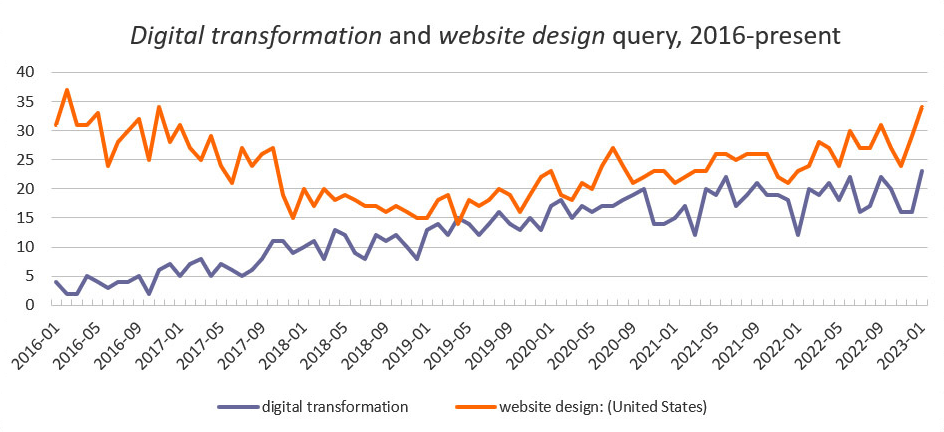Digital Transformation Is Dead
Digital transformation is dead, long live digital transformation.
The term was widely expanded, perpetually redefined, then declared dead a decade ago. But in 2019, Harvard Business Review found that digital transformation risk was senior executives’ number one concern. These days, the term has dedicated pages on the websites of Deloitte, Ernst and Young, and Accenture.
Companies seeking to modernize, automate, and reach new markets demand digitalization. At High Seas, we often see mid-sized and even large legacy firms looking for a new or upgraded website and online functionality without fully realizing that information technology can be a strategic advisor to business. When developers and strategists team up, digital transformation can translate to elevating corporate profits, customer satisfaction, employee engagement, and operating efficiencies.

Relative frequencies of Google queries on “Digital transformation” and “website design,” 2016-present
To be truly meaningful, digital transformation can’t just be a set of technology tactics; it must be a strategy to leverage technology to propel business growth. Since, as Gartner aptly writes, the term can be used to describe everything from IT modernization to the invention of new business models, its effects are equally as broad.
Accenture sees digital transformation as a process through which companies embed technologies across their business activities to drive fundamental change. For Ernst and Young—focusing mainly on financial service clients—digital transformation is about product and service innovation. Deloitte views it as the end-to-end business transformation of an organization enabled by exponential technologies. All of the above consider digital transformation an enabling factor of innovation.
The knowledge of workflow nuances, bottlenecks, and workarounds held by employees can be used to design and optimize the mix of tools, processes, and practices that form the digital workplace.
Four key areas of digital transformation, according to Microsoft, are empowering employees, engaging customers, optimizing operations, and product and service innovations. Digital transformation in an organization presents huge opportunities for employers to rethink empowerment of their workforce. With many of today’s businesses operating digitally, having an efficient workplace is dependent on how technology is used throughout the company. The knowledge of workflow nuances, bottlenecks, and workarounds held by employees can be used to design and optimize the mix of tools, processes, and practices that form the digital workplace, Forbes writes.
Likewise, customer engagement is critical in a virtual marketplace, and businesses must evolve to accommodate the rapidly shifting preferences and expectations of today’s customers. Processes are automated for a smooth customer experience and supply chains are becoming transparent demand-response networks. An example from the banking sector, allowing clientele to close an account online without requiring a phone call to an 800 number or a visit to a brick-and-mortar bank reduces friction.
Internally, companies can use digital transformation to streamline their operations and help provide new market opportunities. Examples given by Accenture include re-platforming to dismantle internal silos, cloud computing for efficiency, and using machine learning to redesign supply chains. A digital transformation journey requires reimagining how a company does things from the ground up and puts data at the heart of an organization underpinned by technology.
Organizations can use digital transformation to create a unified and elastic culture, restructure their infrastructure to achieve organizational effectiveness, and better understand the needs and expectations of consumers. While the term encompasses a vast subset of technology, Deloitte boils it down to implementing new tools, platforms, and business models to enable competitive differentiation.
Accenture summarizes the benefits of digital transformation as “increased efficiency, greater business agility and, ultimately, the unlocking of new value for employees, customers and shareholders.”
High Seas partners with clients of all sizes to craft inspiring solutions that enhance how the world interacts with their brands. We have deep experience in business process improvement, responsive website design, mobile development, and marketing campaigns. Contact us to learn more about how the High Seas team can support your digital transformation.